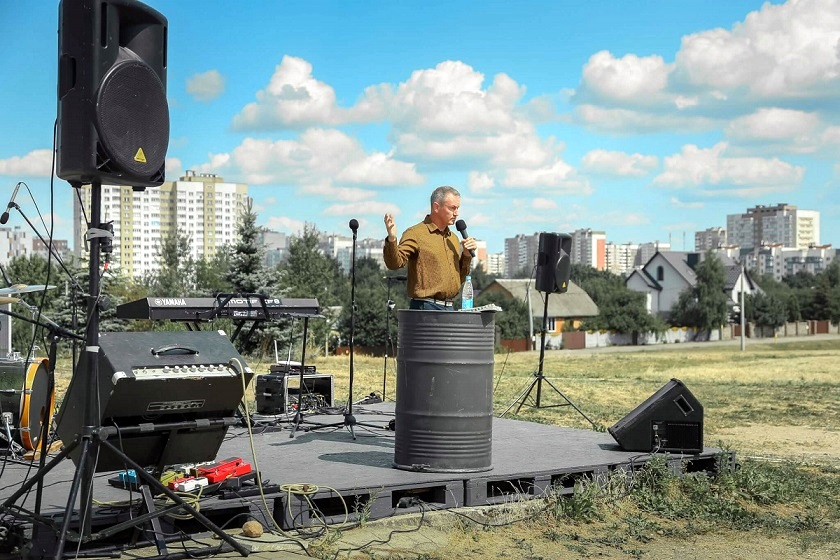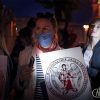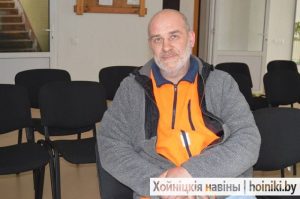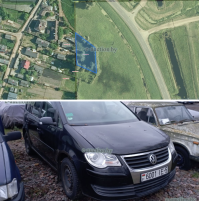Forum 18. BELARUS: Administrative, criminal charges for evicted Church’s outdoor worship?


Organisation"Forum 18"
Норвежская организация, целью которой является содействие религиозной свободе.
At a meeting in Parliament and two letters, officials warned New Life Pentecostal Church that continuing to meet for worship in the car park of their seized church in Minsk could lead to administrative or criminal prosecution (maximum punishment four years’ imprisonment). The Church vows to continue its worship. “The authorities may initiate criminal charges as they told us at the Council of the Republic meeting,” Pastor Vyacheslav Goncharenko told Forum 18. “This is possible, given that they have gone as far as throwing us out of the building without compensation and imposing debts.” City and state religious affairs officials refused to discuss the threats. Officials are threatening Pastor Vyacheslav Goncharenko and other members of New Life Pentecostal Church in the capital Minsk with administrative and criminal charges for continuing to hold meetings for worship in the open air in the church car park. The Church has held services outdoors each Sunday in snow, rain and hot sunshine in the more than half a year since officials evicted the congregation from its building on 17 February.
At a 14 July meeting at the Council of the Republic, the upper house of Parliament, officials warned Pastor Goncharenko that violations of the law could lead to prosecution (see below).
This was followed by a 23 July letter from the Administration of Minsk’s Moscow District warning Pastor Goncharenko that the Church’s worship meetings are illegal. A 5 August letter from the City Executive Committee reminded him of administrative and criminal punishments (of up to four years’ imprisonment) for organising and participating in illegal meetings (see below).
The Church will continue to meet for worship every Sunday. “This is risky,” Pastor Goncharenko admitted to Forum 18 from Minsk, “but we keep praying as everything can change. We know this from experience.”
Pastor Goncharenko took the official letters seriously. “The authorities may initiate criminal charges as they told us at the Council of the Republic meeting,” he remarked. “This is possible, given that they have gone as far as throwing us out of the building without compensation and imposing debts.”
The New Life Church community says it is not going to give up its seized building and will struggle for its rights. Pastor Goncharenko said that the Church will continue to negotiate with the authorities.
The Head of the Ideology, Religion and Ethnic Affairs Department of Minsk City Executive Committee, Anna Koronevskaya, refused to comment on the situation with New Life Church. Nor would she answer why officials are threatening the Church and whether they intend to shut it down. “The church leaders have all the information, and I am not allowed to give comments on the phone,” she told Forum 18 from Minsk on 19 August.
Andrei Aryaev, Head of the Religion Department of the regime’s Office of the Plenipotentiary for Religious and Ethnic Affairs, refused to discuss the situation of New Life Church. “I am not authorised to give any comments, this issue is being addressed and addressed actively,” he maintained to Forum 18 on 19 August.
Police and court bailiffs forcibly evicted New Life Church from its building on 17 February, using an angle grinder to cut the door lock to gain entry.
For more than 15 years, members of New Life Church have been in confrontation with the authorities who claim its building. The Church bought a former cowshed on the western edge of Minsk in 2002 and converted it into its place of worship, turning it into a spacious, modern structure. The authorities consistently refused to change its legal designation as a cowshed.
Also facing large demands for money is the Catholic Church of Saints Simon and Helena (known locally due to its brickwork as the Red Church) in central Minsk. The amount demanded by the building agency of Minsk City Executive Committee more than doubled between December 2019 and May 2021. The regime has refused to hand back the building to Church ownership (see below).
Amendments to the 1997 Mass Events Law which came into force in June now require organisers of mass events to get permission from local administrations before they start to advertise them. Holding mass events without such permission is punishable. “Though there is no direct reference to religious organisations, it could in practice be interpreted more widely, meaning that it may also affect religious organisations,” a Minsk-based human rights lawyer (see below).
Among more than 50 non-governmental organisations ordered liquidated in July was Vedanta Veda, a Hare Krishna-linked cultural organisation in Mogilev, human rights group Human Constanta which defended a Russian Jehovah’s Witness seeing sanctuary in Belarus, and two charities established by Protestants (see below).
Meeting in Parliament reaffirms earlier demands
On 14 July, officials summoned Pastor Goncharenko to a meeting at the Council of the Republic, the upper house of Parliament, to discuss the situation with New Life Church. Leading the meeting was Viktor Liskovich, chair of its Permanent Commission for Education, Science, Culture and Social Development. Also present were one official each from Minsk City Executive Committee, Moscow District Administration and the office of the Plenipotentiary for Religious and Ethnic Affairs.
Officials warned Pastor Goncharenko that the Church was breaking the law and that prosecution could follow. They reaffirmed their insistence that the Church must pay the tax demands from Moscow District’s Housing Repairs and Utilities Association (see below). Officials made no mention of any compensation for the seized building.
In the report on the meeting published on the Church’s website the following day, Pastor Goncharenko noted that the atmosphere of the meeting was “not straightforward”. He highlighted that the officials talked dismissively about the Church, describing their earlier hunger strikes in defence of their place of worship as “unacceptable”.
“None of them mentioned the huge amount of work the church has done for the city,” Pastor Goncharenko noted.
Warning letters
On 23 July, Valentin Konoplyov, a Deputy Head of Minsk’s Moscow District Administration, warned the Church in a letter (seen by Forum 18) against holding what it called “unauthorised meetings”. He noted that the Church had never sought permission for its outdoor meetings.
A 5 August letter, signed by a Deputy Head of Minsk City Executive Committee Artyom Tsuran (and seen by Forum 18), reminded Pastor Goncharenko that he and Church members are liable for punishment for holding such meetings without state approval.
Tsuran said they could be prosecuted for violating Article 24.23, Part 2 (“Violation of the procedure for organising or conducting a mass event or demonstration”) of the new Administrative Code, which came into force on 1 March 2021. Article 24.23, Part 2 carries punishment of a fine of up to 150 base units (about 3 months’ average wage for those in work), community service or a jail term of up to two weeks. A second prosecution within a year of a first carries a maximum punishment of 30 days’ imprisonment.
In the case of systematic violation, Tsuran reminded him, Pastor Goncharenko and Church members could face prosecution under Article 342, Part 1 of the Criminal Code (“Organising group actions grossly violating public order and accompanied by clear failure to submit to legal demands of officials”). This carries a maximum punishment of four years’ imprisonment.
Noise complaints
The 23 July and 5 August letters to New Life Church refer to alleged complaints from residents living near the church car park where the congregation holds open-air worship services for an hour each Sunday. “Complaints have been lodged from residents of Minsk’s Moscow District about public religious events held in the open area at the address Kovaleva 72 with the use of loudspeakers,” the 5 August letter maintains.
Asked whether the Church had received any complaints, Pastor Goncharenko said that only once had they received an e-mail about loud music. “We turned the loudspeakers down immediately after the complaint,” he told Forum 18.
Pastor Goncharenko added that the worship meetings were adjusted to the convenience of the district residents “starting at mid-day when everyone is awake and lasting for an hour”. “We don’t know if people lodge complaints with the administration, but there are a lot of people who express their sympathy,” the pastor commented.
The city authorities refused to discuss with Forum 18 whether local residents had indeed complained about any inconveniences caused by New Life Church’s hour-long Sunday meetings for worship in the church car park.
Alternative venues – too expensive, too distant and too small
In the 5 August letter, Tsuran of Minsk City Executive Committee offered New Life Church two possible premises to rent for meetings for worship. Both Houses of Culture are located in south-eastern Minsk, while the community is currently based in the south-western part of the city.
Pastor Goncharenko complained that the meeting places officials are offering are not suitable for the Church as they are located too far from where most church members live. “One of them is too expensive and the other is too small to accommodate all of our members,” he explained to Forum 18 on 24 August. “Our church lives on donations which may not be regular, so paying rent compared to owning a building is not secure.”
Demand for land tax
Echoing the demand made at the 14 July meeting, Tsuran’s 5 August letter repeats the demand that New Life Church pay the land tax for the whole period while the Church used its building, in the amount of 458,918.22 Belarusian Roubles (1,600,000 Norwegian Kroner, 155,000 Euros or 180,000 US Dollars). Unless the Church pays this sum, the authorities will not allow it to build a new place of worship.
Under the Presidential Decree on Tax Exemption of Religious Organisations of 1 December 2005, New Life Church is not subject to land and property taxes. However, this privilege does not extend to the Housing Repairs and Utilities Association, to which the city administration handed the Church’s land in 2005 and its building in 2009. The Housing Repairs and Utilities Association shifted the burden of taxation to the Church, sending eviction demands to the economic courts.
Pastor Goncharenko described the sum of money demanded from the Church as “huge”. He insisted to Forum 18 that the Church does not intend to pay this sum, referring to the Presidential Decree exempting religious organisations from tax. “They think we are rich, but were it so we wouldn’t have bought a cowshed for our worship meetings in the first place,” he joked bitterly.
The chief accountant of the Housing Repairs and Utilities Association of Minsk’s Moscow District, Irina Osipova, refused to answer any questions and referred Forum 18 to the Association’s Head, Maksim Tishuk. Reached on 1 September, he too refused absolutely to answer any questions by phone.
Other communities face state-imposed debts
Despite the 2005 Presidential Decree exempting registered religious organisations from tax, the state lets out historical religious buildings it owns to religious organisations, requiring them to pay for the land and buildings they use.
The Catholic Church of Saints Simon and Helena (known locally due to its brickwork as the Red Church) in central Minsk also belongs to the City Executive Committee. It claimed in December 2019 that the parish owed its building agency Minsk Property more than 160,000 Belarusian Roubles (585,000 Norwegian Kroner, 55,000 Euros, or 65,000 US Dollars) for restoration work and tax. It also demanded just under 13,000 Belarusian Roubles (47,500 Norwegian Kroner, 4,500 Euros, or 5,300 US Dollars) a month as rent.
The parish did not pay the debt, hoping to resolve the issue by negotiation. However, by May 2021 the debt Minsk Property was demanding from the parish had risen to 350,000 Belarusian Roubles (1,200,000 Norwegian Kroner, 118,000 Euros, or 140,000 US Dollars), Euroradio.fm noted on 12 May. By then, the parish had collected two cardboard boxes containing 20,000 signatures on a petition to the Presidential Administration calling for the building to be handed over to Church ownership.
Increased state control of “mass events”
Due to political opposition protests, the regime has tightened control over any activities involving large numbers of people, which also affects public religious events.
On 26 June, amendments to the 1997 Mass Events Law came into force. Mass events can now be organised only after obtaining permission from the local authorities, who are entitled to determine the place and to change the nature of a proposed mass event. Broadcasting live an event held without authorisation is prohibited.
Organisers and ordinary people are not allowed to call publicly for, announce in the media or on the internet, or distribute leaflets and other materials before officials authorise a mass event. If a leader of an organisation does so, the organisation itself is obliged to announce its disapproval of these actions in the media, otherwise it will be punished in accordance with the law.
The regime also punishes financing, rendering services and compensation of expenses related to a mass event held with violations of the law.
These requirements also restrict the public exercise of freedom of religion or belief. “Though there is no direct reference to religious organisations, it could in practice be interpreted more widely, meaning that it may also affect religious organisations,” a Minsk-based human rights lawyer commented to Forum 18.
“If a religious organisation refuses to change an event (for example, instead of a march or a pilgrimage to hold an ordinary religious service), most likely it will not be allowed,” the lawyer added.
In January 2019, the Council of Ministers adopted Decree No. 49 “On the procedure of payment for public security provided by Police, for healthcare services, for cleaning venue after the public event” which requires payment in advance for police, healthcare and cleaning services. The Decree sets the price list depending on the number of participants.
The authorities selectively use the Decree depending on their attitude to the religious community. In 2019 Greek Catholics had to cancel their regular pilgrimage from Vitebsk to Polotsk over the “unaffordable” fee, while Catholic Corpus Christi processions were held without the authorities levelling any charges.
Events cancelled – or postponed?
Officials often use the coronavirus pandemic as a reason for cancelling large religious events. However, restrictions appear to be imposed selectively. In 2021, the traditional organised pilgrimage on foot to the Catholic shrine at Budslav north of Minsk was cancelled, though services were held at the shrine on 2 and 3 July. Laypeople were invited to come individually.
However, an Orthodox five-day Cross Procession from Mogilev to Mstislavl in eastern Belarus is planned to begin on 5 September.
The traditional international religious music festival Mahutny Bozha (Mighty God), which has been held in Mogilev since 1993, since 2011 once every two years, should have been held in 2021. The festival was last held in 2019.
Asked on 31 August 2021 why the Mahutny Bozha festival had been cancelled in 2021, the Head of the Culture Department of Mogilev City Executive Committee Marina Klepchukova assured Forum 18: “Of course, it is not cancelled, just postponed until next year because of the pandemic.”
Asked why the Slavic Bazaar international arts festival in Vitebsk had not been cancelled or postponed, Klepchukova pointed out that it was more for Belarusian people and recommended Forum 18 to ask the Vitebsk authorities.
Catholic journalist Maksim Hacak regards this as an excuse. “The pandemic is not an obstacle to holding official events,” he commented to Forum 18 on 31 August. “It stands in the way only of opposition and unofficial activities.”
The Mahutny Bozha festival’s title is closely associated with the hymn Mahutny Bozha (Mighty God), which since August 2020 has often been sung by protestors against the regime’s election falsification and violence. The Lukashenko regime has tried to suppress singing of the hymn. Police raided Minsk’s Catholic cathedral after the congregation sang the hymn at the end of Mass on 3 July 2021.
Organisations liquidated
In July, the regime ordered liquidated more than 50 non-governmental organisations, allegedly on the grounds of foreign financing.
Vedanta Veda was a private educational society connected to the Hare Krishna community in Mogilev which gave lectures to those interested in Veda culture and philosophy. It was registered in March 2011. The local Administration initiated its liquidation on 14 July 2021.
Dmitry Ivashkov, a Vedanta Veda leader, complained that he received a liquidation order accusing him of illegal business activities. “The real reasons are unknown to me and the response from the Prosecutor’s Office to my inquiry did not clear up this issue,” he told Forum 18 on 31 August.
Also ordered liquidated was Human Constanta human rights advocacy centre in Minsk, founded in 2016. Minsk City Executive Committee initiated its liquidation on 22 July. Human Constanta had defended the rights of a Jehovah’s Witness who had sought protection in Belarus from criminal prosecution in his native Russia to punish him for exercising freedom of religion or belief.
Among other liquidated (and therefore banned) organisations are two established by Protestants. Family and Children Support Centre in Bobruisk, which included volunteers from various Christian communities, addressed family rights issues and helped families with many children. It was registered in February 2014. The local Administration initiated its liquidation on 13 July 2021.
Also ordered liquidated was ACET (AIDS Care Education Training), an educational centre based in Orsha and supported by volunteers from local Protestant churches. It was registered in July 2007. The local Administration initiated its liquidation on 7 July 2021.
Source: Forum 18








